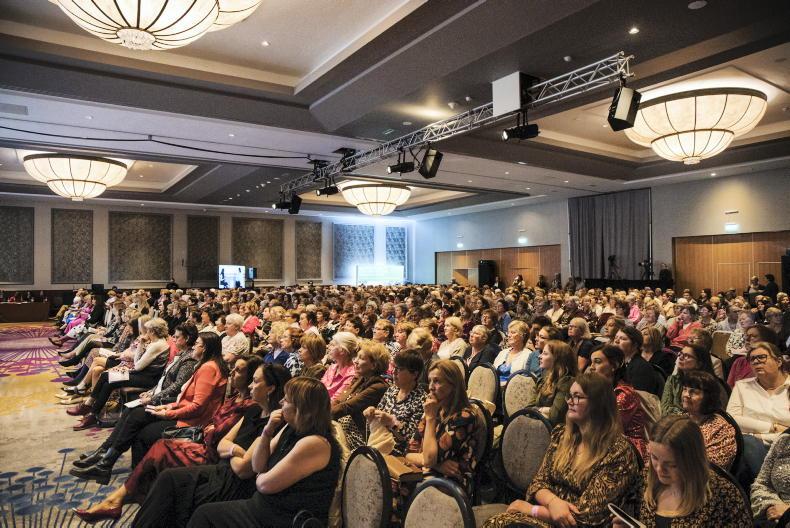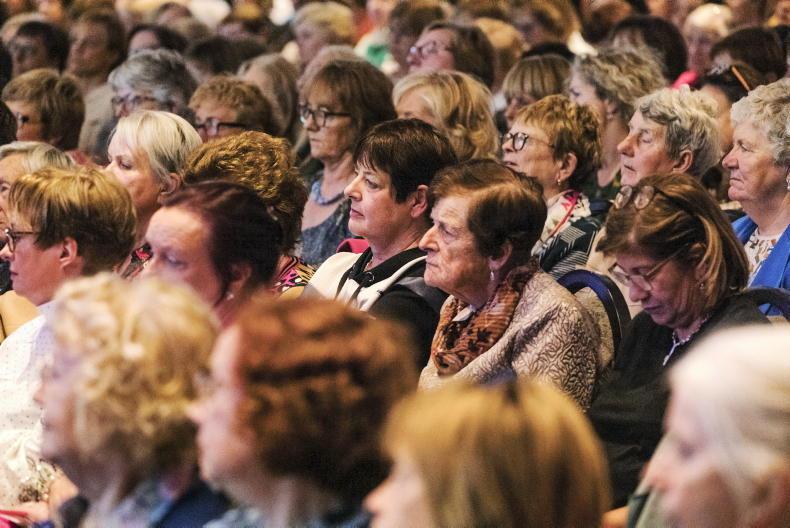It has been a rocky road for women who worked alongside their husbands or partners paying PRSI and for many, who had no contributions, they were means tested for a dependent’s allowance on their husbands or partners pension, Carlow woman Marian Dalton has said.
Speaking at the Women & Agriculture conference on Thursday in Kilkenny, she said that what has annoyed her the most on the matter is that no letter is written to these women to inform them that they will be means tested.
“It is written to their spouse. All requests regarding information on their means is directly written to their spouse and at no time is any personal contact made with the woman. In 2024, I find this difficult to accept.
“These are farming women who have worked hard on farms for many years with little recognition or no recognition for what we did. Surely, we should receive such requests in our own names or even in joint names?"

“Would civil servants be treated in this way, women who are married to civil servants or any other professions?” she asked.
Domestic violence
Another speaker highlighted the issue of domestic violence in rural Ireland.
“There’s 600 women here today. Domestic violence has not been spoken about.
"In rural Ireland, when a woman is suffering domestic violence and she has no money, no car and is at the foot of a mountain and has a husband that can corrupt the system with a chequebook… that woman and her children are doomed.
“It takes many forms. I have been a senior health professional in rural Ireland for some years and it was ripe then.
“Domestic violence by men to their wives is ripe. Domestic violence to female elderly mothers of farmers is ripe,” she said.
Carers
Gretta O’Leary from Cork highlighted issues with carers' benefits and called on the those in the room to highlight the issues facing carers to those running in the next general election.
“I am a carer for my 35-year-old son - I couldn’t be here today without the help of my husband.”
She said that it is unbelievable that carers only receive “half pay” when they get their pension while still looking after somebody.
“I’m 70, my husband is 76, we get nothing. They have the cheek to come and cut the carers allowance. His care hasn’t changed in 35 years,” she said.

Mary Leamy from Waterford said that there is a lot of social isolation in the country.
“In the area where we live, we’re trying to get rural transport to bring people to the local primary care unit and mental health clinics.
“We were told that the area we live in is not suitable for the local transport bus to travel on.”
TB
A woman from Westmeath questioned when the Government would finally eradicate TB from the cattle herd.
“TB is going on a very long time at this stage. Is the Government quite happy to let this roll on? Is it the Government’s indirect culling of cow numbers? Where is the cut-off? People can’t take much more.”
Linda Moore called on the women in the room to highlight the ongoing atrocities in Palestine.
Over 42,000 people have been killed and 16,000 children have been killed, she said.
“I’m asking that we all call on our representatives to enact the occupied territories bill, impose sanctions on Israel,” she said, also calling on consumers to not buy goods from Israel.
“Stop the use of Shannon Airport by US military for the transport of weapons. We’re supposed to be a neutral country, we need to make more noise.”
Wills
Majella O’Dea from Athenry, Co Galway, urged the mothers in the room to communicate with their children about their will.
“We have to end the secrecy around wills.
“For the mothers here, can you communicate with all your children now what the outcome is and for it not to be a horrendous disaster or surprise. Wishes can be made, but are not in the final will. It also depends on which parent dies first,” she said.

Stephanie Walsh, a food business consultant with ifac who is based in Sligo, told the conference that the VAT rate is a key challenge for cafés and restaurants.
“Living in rural Ireland with lots of cafés and restaurants - VAT reduction is a key challenge. It’s really important to keep rural Ireland alive and make sure it’s a place we want to live in, to let small businesses grow and be profitable.”
Supports
Mary O’Connor from Killarney called for more supports to be put in place for women in the event that their husband dies suddenly.
“I lost my husband seven years ago suddenly. I had no immediate family around me and I was slow to involve neighbours. I was at a total loss about where to go and what to do.
“I contacted the IFA that I was paying a subscription to yearly - they weren’t able to help. There should be a roadmap there for women who have lost their husbands.
"We should be handheld at that point, where everything is sorted about making a will and the first few days of the funeral,” she said.






 This is a subscriber-only article
This is a subscriber-only article










SHARING OPTIONS: